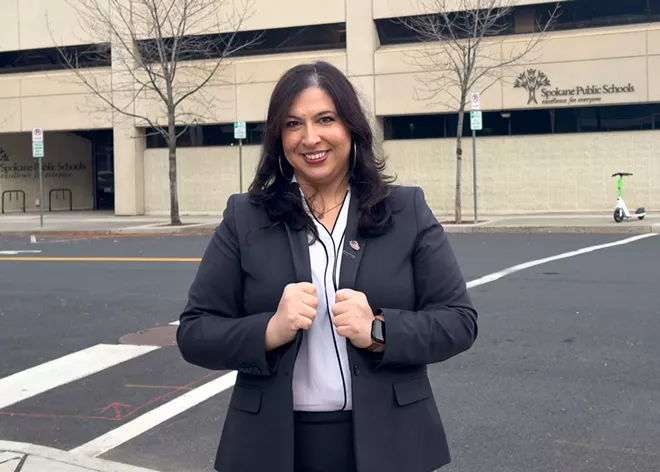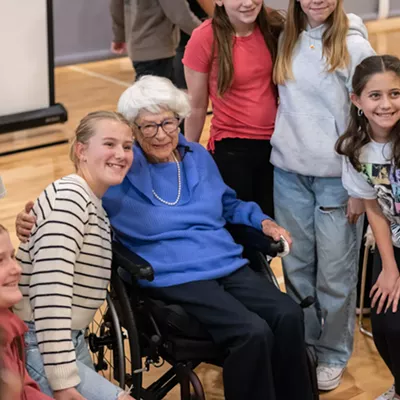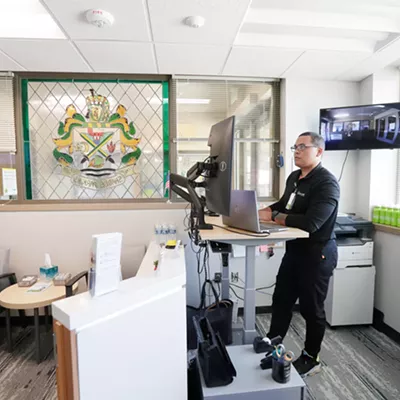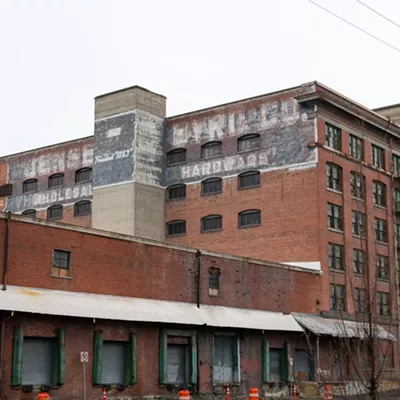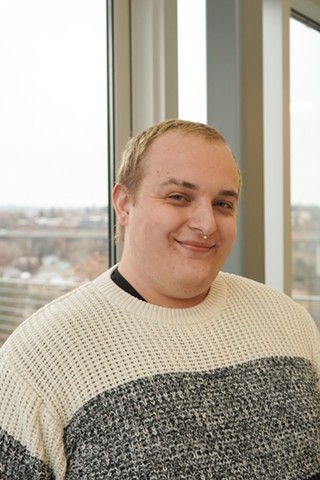In August, the Spokane Public Schools Board of Directors learned it would need to appoint a new member to its ranks as Melissa Bedford and her family were moving out of town.
The remaining Spokane School Board members evaluated nine candidates for the position, ultimately voting at the Nov. 1 meeting to appoint Nicole Bishop, who works as the philanthropy manager for Spokane Neighborhood Action Partners, or SNAP.
Bishop, 36, has worked at SNAP for nearly seven years, and before that she worked for two years at the Jonah Project, a nonprofit that serves survivors of human trafficking and at-risk youth and women.
Before she made her way into the nonprofit world, Bishop earned a political science degree from Amherst College in Massachusetts in 2012. Though she says attending the small liberal arts college was one of the best experiences of her life, it also became a lesson in class differences for Bishop, who grew up in Spokane.
“I felt like a fish out of water at times because I was this public school kid who lived on public assistance, going to school with a lot of trust fund kids who went to private schools. It took me a long time to accept that there’s not much that separates us,” she says. “That experience of trying to overcome the imposter syndrome is what’s given me the courage to do things, like applying for the School Board.”
Bishop was sworn in on Nov. 6 and must run for election to the seat next year if she hopes to stay on the board.
We met Bishop at Revival Tea Company two days after she was sworn in and talked about why she applied, what makes her unique among the five-person board and what her priorities are. This interview has been lightly edited for clarity and length.
INLANDER: Why was it important for you to apply for this School Board position?
BISHOP: I know it sounds cliché, but my mom. She was always the mom who was in our classes, and she was a safe place for a lot of kids who maybe didn’t have that at home. I saw that without an advanced degree or a fancy job title, she was able to make a really huge difference for the kids just by being who she was.
She passed away, gosh, three years ago, and part of me really just wants to keep her legacy alive. Spending a lot of time in a classroom intimidates me a little bit, but with my degree, this is where I can make a difference.
Is there a piece of advice that you’re carrying with you as you get your feet under you?
I spoke to former director Melissa Bedford, and her advice to me was to “always remember your ‘Why?’ That’s your true north.” I think it will really power me through some of the harder days.
In 2011, you spent four months as a speechwriting intern for then-Vice President Joe Biden. Is there anything that you’re pulling from that experience as you start your new position?
Yeah, that experience was really interesting for a ton of reasons, one of which is that summer was when there was a huge debate about raising or lowering the debt ceiling. I was actually really sad because I didn’t get to write as many speeches as I wanted to, but I still learned a few things. First, I learned that this particular type of partisan politics is not in my DNA, it’s just not a match, which is kind of what led to my pivot to nonprofits.
As a speechwriter, I also learned how to try to cast a wide net to make a lot of people feel accepted. When you’re working in that kind of environment, anything that you say is under a microscope, especially when it’s coming from the vice president. It gave me a lot of practice to understand how to present topics in a way that can be palatable to a lot of people.
I think that’s helpful now, because by nature of the School Board, you have schools and families with widely varying beliefs and needs and desires. So being able to explain things in a way that more people could maybe understand or accept as well as they can is a helpful skill.
You also worked as an intern for U.S. Sen. Maria Cantwell, who was just elected to her fifth term in Congress. You realized that highly partisan positions weren’t for you, but would you recommend internship experiences like these for SPS students interested in political science?
Absolutely. Especially at that age in life, it was a great way for me to critically think and try to put myself in other shoes to try to understand differing views. I think that a public servant’s role is to try to understand everybody, even if you disagree, and so I think it does prime these interns for that.
Between political positions and nonprofit jobs, most of your adult life has been spent working for the public. Is that something you always planned for?
I think working for the public has always inspired me in different ways, but it really took coming home [after college] to realize that serving the public is my goal. That’s what led me to nonprofit work, and I have to say, I feel so fulfilled.
Obviously in any job, you’re gonna have days that are really, really hard, but even with those days I’m still excited to go to work. My heart skips a beat because I’m proud of what I do, and I feel like the School Board is a similar feeling to that. There are going to be really hard days and there’s going to be opposition, but knowing that it’s that public good that I’m pursuing, I’m going to feel good regardless.
How do you set yourself apart from the rest of the board members?
I have a unique lived experience. You know, growing up there were times of housing instability, and I changed schools a lot until second grade. I’m also the daughter of an immigrant. My dad immigrated from Iran at the turn of the revolution, so I’ve been able to bear witness to what that experience is like, though I haven’t personally experienced it as an immigrant.
This isn’t to say that the members on the board can’t understand and advocate for all parts of Spokane, and actually, I think they’ve done that really well. I’ve had a lot of that experience to understand the needs of people in Spokane beyond my immediate circle, but I think geography may help a bit with that.
You’re the only School Board member who lives outside the South Hill. What does it mean to you to be the only north Spokane representation on the School Board now?
There’s definitely some pride, and I think I feel a responsibility to make sure that I’m advocating for the north side in every corner. In my day job, there’s always one person who’s assigned to ask, “Where did equity come up in this meeting?” at the end of each meeting. I feel on some level my responsibility will be there, but with the north side. They have unique needs, and I want to make sure that there’s a dedicated person to speak up for that.
What are some of your first priorities?
What I’m really interested in right now is trying to continue through the thread that made things good and productive when I was younger, like in the ’90s and ’80s before that, while being able to also stay updated with modern technology and the changing world. A great example is the recent cellphone ban. I think that’s a really unique way the district can allow students to interact face-to-face in a way that was so common before.
Being a millennial puts me in a unique position. In a way, I grew up in both worlds, where my childhood was very analog, but then my later years were very digital. Being able to straddle those two worlds is something I’m passionate about, because I do have that unique cultural perspective.
President-elect Donald Trump has said he wants to do away with the Department of Education, which could put many elements of public education as we know it on the chopping block. How would you respond to that potential divestment from public education?
Wednesday night was when I was sworn in, and it turned out to be a hard day for me and for a lot of people. It is a hard moment and I can understand feeling despondent in a way.
I think the silver lining for me is that I have the opportunity now to be kinetic and to work on change, and not just sit on the sidelines and feel like my hands are tied. Now more than ever, I think it’s critical that people in this position are stewards for public education. We work to make sure that when students feel like they might not belong, or might be fearful about things in the future, or feel like their differences aren’t OK, that the School Board is there to nurture a culture that reassures them that all of those things are OK. ♦

